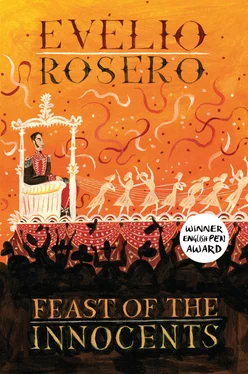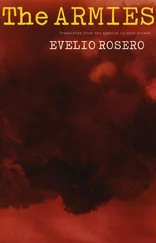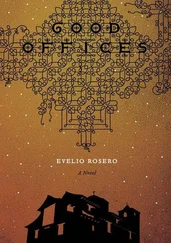Following that apparition, when the light changed to green and the jeep was starting to pick up speed, a shadow stepped out in front of him. He had to slam on the brakes: it was a very pale, tall young man, who stood looking at him fixedly after the sudden halt, and even came towards him, up to the driver’s window, when he set off again, as if he wanted to ask him something; the doctor braked again and wound down the window to hear him, but the young man kept on going, without so much as a gesture. That young man was Enrique Quiroz, the eldest of the Quiroz brothers, Enriquito, the instigator — according to Professor Chivo — of the beating he had received at the hands of masked thugs. The doctor knew about the incident, but he did not know Quiroz.
And very soon he forgot about the passer-by who almost got himself run over at a traffic light.
They pretended to be a theatre group, in order not to arouse suspicion, as they put it. Every Saturday morning they met at the parish church of Nuestro Señor de los Despojos, in the community hall, to “rehearse”: they were putting on a theatrical version of The Imitation of Christ , the idea of Rodolfo Puelles, poet of the group, but a secret poet to boot, as no-one knew — nor could they know — about his poems.
Puelles himself hid them: if his comrades discovered what they were about — which had nothing to do with the social emancipation of the people — they would not only brand him bourgeois, but a pervert. Because he wrote erotic verse, which he described as “about humorous love.” His work in progress was titled Nineteen Sugar Bums and an Enchanted Vagina , and the “First Bum” began: “ Teresa into whose bum the dick begins/To vanish… ”
There were twelve of them, all men. The only woman, Toña Noria, a lanky black girl from Barbacoas, who studied agriculture, had been expelled from the group by common consent because “her natural lubricity disrupts the activity of members.” She did not care: from the left-wing group she moved on to the university choir and then the women’s chess team. Her absence was lamented solely and secretly by Rodolfo Puelles, who had already immortalized her in the most torrid of his poems, “The Enchanted Vagina,” which he wrote without yet having exchanged more than a word with Toña Noria, as all he could do was idealize her during lengthy study sessions. Rodolfo Puelles tried to make up for such things with his poems of humorous love and by mocking the world and the poetry of his country, but more than anything mocking his own solitude, because at the age of twenty-two he had never known a woman, let alone love.
The group was a completely anonymous band of students, which sought to link itself to the National Liberation Army, with none of its members knowing whether the likelihood of that link was real or pure fantasy. They talked of “urban nuclei,” “urban networks” and “cells” within the student body; they were marked by a clear “pro-China orientation”; they attacked not just “the system” but the traditional Communist party, the “fascistization” of the university, “proverbial obscurantism,” “McCarthyism,” “anarchist tendencies within the student body,” “revolutionary spontaneity,” “verbal ultra-radicalism,” “divisive factions.”
And the sole “contact” with the “forces of the revolution” was Enrique Quiroz, who claimed to know leaders and was in constant communication with them about what steps to follow, but did not give out further information on the imminent link-up for reasons of “revolutionary security.” Be that as it may, the journeys Quiroz had been making to Bogotá and other cities, for months, guaranteed some truth to it all. His efforts were anxiously followed by everyone; there was even talk of representatives of the guerrilla war visiting Pasto in a few weeks: they would interview members of the group personally and “baptise” the chosen ones. The group, in spite of not belonging to any real political force, deemed itself radical, along Marxist-Leninist-Maoist lines, and had not yet identified the name of the armed wing it intended to support, whether it be independent or in the service of the organized revolution. In Pasto there were twelve members. At least as many again were waiting for them in Bogotá, plus two or three sympathizers in other major cities around the country. The Pasto twelve went to a lot of trouble over their cover as actors and assured everyone they would be presenting their Imitation of Christ to Pasto and the whole wide world in 1967—on March 19, Saint Joseph’s Day — it being a work of reflection and devotion never before seen on the stage. At least, that is what the parish priest, Joseph Bunch, said about it; a closet homosexual — clandestine, like the poet — Bunch gave them his support and also spied on them from time to time, ogling them when gym was part of their rehearsals; but neither the Quiroz brothers nor anyone else from the group, the poet included, had read a single page of The Imitation , and quite possibly Father Bunch never had either, they joked. With a theatrical enterprise like this, designed to extol the priest’s good Catholic deeds, they felt safe from the enemy: camouflaged .
Enrique and Patricio were the eldest sons of Sebastián Quiroz Carvajal, the architect; there were eight sisters behind them. Neither of the brothers had yet finished his university studies, and they were getting ready to go to Bogotá to continue them. The others in the group were working hard to do the same. They would all go: things “happened” in Bogotá; Pasto was “asleep.” What is more, it was not possible for them to use their noms de guerre in the small city because people knew who they were, had done since they were children. It was different in Bogotá: there, Enrique Quiroz was “Vladimir,” and at twenty-seven years of age had, not one, but two families of his own. One with “Tania” and the other with “Simona.” With the former he had three children: Lenin, Miguel Mao and Lenina, and with the latter, two: Simón Ernesto and little Stalin, just six months old. In Pasto, his third family was on the way, secretly, with his pregnant cousin Inés Bravo. No-one at home knew anything about all these households — three women and six children — but it was the architect Sebastián Quiroz Carvajal who, never dreaming it, supported them all. This did not stop Enrique Quiroz, after receiving his generous monthly allowance, referring to his father as an “old retrograde,” “iniquitous bourgeois” and “petty oligarch.” Enrique did not worry about his families’ straitened circumstances, circumstances he did not share with them, or worry about bringing further children into the world. He talked of “more soldiers for the revolution” and it was precisely for this reason that his brother Patricio, “Boris,” admired him. Patricio already had his first soldier on order, with a pure-blooded indigenous woman from the Sibundoy Valley, and he was euphoric about it: this presaged the incorporation of indigenous peoples into “the cause”; there was a new race on the horizon. Patricio Quiroz was the only member of the group not studying law and political sciences: he was doing economics, but considered himself an artist, and for years had been saying he was composing the great anthem of the Colombian Revolution. A heavy drinker, he played the accordion and crooned serenades.
The members of the theatre group appeared so committed that they even “rehearsed” on Saturday, December 31, the last day of the year, despite the sounds of celebration drifting through the streets. That morning they were settling how to bid the year and Pasto farewell, as once carnival was over they would travel to Bogotá, all of them already enrolled in the National University of Colombia. The plan was to shape an urban guerrilla war, in Bogotá, an idea they had been working on for months. While in Pasto, the city of their birth (although three of the twelve were not Pastusos: one came from Cali, another from Chocó, the third from the plains), they planned to put an end to the dangerous treachery of a multimillionaire gynaecologist, Doctor Justo Pastor Proceso López, close friend of the madman Chivo, who meant to mock the Liberator Simón Bolívar, father of the revolution, with a carnival float.
Читать дальше












